The Ominous Return of Trump: What It Means for the World
Once again, the world finds itself on the brink of another heated U.S. election season, and this time, the repercussions could be global. Former U.S. President and Republican candidate Donald Trump has reemerged on the political stage, and his presence is impossible to ignore.
Many of us have grown weary of Trump's antics and the never-ending drama that seems to follow him. However, the reality is that we cannot afford to look away, as his influence looms large over American politics once more. Despite facing three indictments, Trump's popularity remains strong, overshadowing his Republican competitors as the first presidential primary debate approaches.
Recent surveys indicate that Trump enjoys a commanding lead among various demographic groups, regions, and ideological factions within the Republican Party. His support among Republican voters has risen from 43 percent in January to 53 percent this month.
His predominantly white conservative base is motivated by deep-seated anger and resentment toward the Democrats and their progressive agenda. Surprisingly, they appear unfazed by Trump's legal troubles, viewing his indictments as part of a conspiracy concocted by the Democrat-controlled deep state.
Barring a major upset, Trump is on track to secure the Republican nomination by mid-year and face President Joe Biden in the year-end election. While Biden currently leads in national polls and maintains strong support in battleground states, such as Georgia and Arizona, there are factors that could put him at a disadvantage, including concerns about his age and fitness for office.
The prospect of Trump's return to the White House has generated anxiety and concern, especially among liberals in the U.S., Europe, and beyond. Many fear that a vindictive and embittered Trump, still in denial about his defeat in the previous election, could wield the immense power of the American presidency recklessly.
Trump appears to be drawing inspiration from Israeli Prime Minister Benjamin Netanyahu's actions since his return to office, particularly in his attempts to enact "judicial reforms" that grant him greater authority and protect him from indictment. Reports suggest that Trump is planning similar measures to consolidate his power, including curtailing the independence of federal agencies, deploying the military domestically, and cracking down on his critics.
Under Trump's leadership, the U.S. could veer away from its liberal foundations towards a more autocratic system, mirroring the trajectory of Israel under Netanyahu. The checks and balances of the American constitutional democracy may struggle to withstand such an assault, especially given the conservative tilt of the U.S. Supreme Court, with three of its members appointed by Trump.
However, the implications of a "Trump 2.0" presidency extend far beyond domestic concerns. His return to the White House could reshape U.S. foreign policy with potentially dramatic consequences for the international community.
During his first term, Trump dismantled many of the global initiatives championed by his predecessor, President Barack Obama, ranging from climate change agreements to international trade deals, nuclear proliferation agreements, and relationships with countries like Russia and those in Europe and the Middle East.
A second Trump presidency could undo much of Biden's foreign policy progress, making it impossible to reach another nuclear deal with Iran and hindering international efforts to combat climate change. Additionally, significant cuts in public spending on social welfare programs and renewable energy are likely.
Trump would also take swift action on the Russia-Ukraine conflict, potentially favoring Russia and undermining U.S. support for Ukraine. This has raised concerns among Washington's European allies, who worry about the weakening of NATO, the emboldening of Russian President Vladimir Putin, and the need to seek alternative security arrangements.
Furthermore, Trump's victory in 2024 could embolden populist right-wing leaders in Europe, leading to more far-right electoral successes in countries like Hungary, Poland, Italy, France, and Germany. Such a scenario could weaken Western alliances and hinder collective responses to global challenges.
Ironically, Trump's return to office might not displease Beijing. While his tough rhetoric against China may suggest otherwise, Trump's erratic approach and isolationist policies could allow China to expand its global influence unchecked.
In this grim vision of a Trumpian world, global stability and cooperation could suffer. It is a future that many hope to avoid, given its potential to undermine democratic values, exacerbate international conflicts, and weaken efforts to address pressing global challenges such as climate change.





0 Comments